Oil and gas have been mainstays of the world’s energy supply for much of the past century and will quite likely continue to play an important role in the global energy mix for many years to come. Despite the steady demand for its products and services, however, the industry that finds and brings these energy resources to market is undergoing significant changes on several fronts.
First, it is widely understood that the sector materially contributes to the planet’s overall greenhouse gas emissions, but it is working diligently to reduce its carbon footprint. Second, with much of the world’s “easy oil” already consumed, upstream oil and gas companies will have to use increasingly sophisticated technologies to find and produce tomorrow’s hydrocarbons.
Future oil and gas resources—especially in non-OPEC countries—will tend to be deeper, harder to find, and in environments that are significantly more difficult to access than they used to be. Third, policymakers and the public have steadily increased expectations for oil and gas companies with regards to environmental stewardship, safety, and human welfare. In the face of these kinds of challenges, technology will clearly play a pivotal role in the success or failure of oil and gas firms in the future.
As a step toward improving how the upstream oil and gas sector develops and deploys new technologies, the first SPE Global Innovation Survey (SPE 166084, SPE-1212-0062-JPT) was put together in 2012 to shed light on several different aspects of how the industry conducts research and development (R&D) and innovation-related activities. The unit of analysis for the first survey was the business unit, and managers from 199 business units around the world responded with data about many aspects of innovation-related activities within and outputs from their respective organizations.
While organizations clearly play an important role in the innovation process, these activities are invariably underpinned by the creativity, know-how, and imagination of individual people. Therein lies the motivation for the second SPE Global Innovation Survey, which was conducted in 2017. It dove deeper into the industry than the previous survey, this time asking individuals from a broad range of roles, levels of responsibility, cultures, and geographical locations about the innovation-related dimensions of their jobs within the upstream oil and gas industry. A deeper understanding of the roles of individuals in the innovation process is more important than ever as the organizations that make up the industry are being fundamentally transformed. Some of the largest oil and gas companies are reinventing themselves as “energy companies” rather than continuing to focus on their oil and gas legacies and are significantly overhauling major aspects of their businesses. How organizations configure their human resources has also changed considerably since the beginning of the COVID-19 pandemic. Individual-level innovative behaviors are therefore more important to understand than ever as the oil and gas sector’s institutions are changing and adapting in the face of these tectonic changes—and the people in the industry are the building blocks that will be reorganized as these changes occur.
But not all innovation-related activities are alike. Some of these efforts involve a relatively modest refinement or an improvement in efficiency within an existing technology, which have been labeled exploitation activities within the technology management literature. Exploration, on the other hand, typically involves risk-taking, experimentation, and discovery. The 2012 survey confirmed what many people in the sector had been saying for some time: the oil and gas sector frequently behaves in ways that seem relatively risk-averse when compared to other industries—but not always, and not everywhere.
Author’s Note: I acknowledge that the word “exploration” also holds significant meaning within the oil and gas industry, typically referring within that sector to the search for hydrocarbon deposits beneath the Earth’s surface. However, I have faithfully applied the words “exploration” and “exploitation” throughout this paper as they are used in the field of technology management so that we can be consistent with the terminology and literature within that discipline. I regret any confusion that might arise from this use of the same word by two different disciplines but hope that my meaning is clear despite this unfortunate coincidence.
This pronounced heterogeneity in some parts of the 2012 survey results gave rise to some important questions for the sector en route to improving its overall innovativeness. Who are the “explorers” within the sector that are hardwired to deliver tomorrow’s bolder technologies? And who are the “exploiters” that, for whatever reason, prefer to stick with less-ambitious innovations that are more incremental in nature? The complete findings from the second survey were presented in SPE 191464. What follows here is a brief overview of the survey’s methodology and a distillation of the more noteworthy highlights.
The Survey
Much as for the first Global Innovation Survey, the second survey was also carried out in collaboration with SPE. With more than 119,000 members in 138 countries, SPE is the largest individual-member organization within the upstream oil and gas industry around the world. A “data firewall” was established so that the survey team did not have access to the identities of participants. We helped to set up the survey and assisted with processing the results, but the name and employing company behind each completed survey was never divulged by SPE.
Consisting of 67 questions, the survey asked respondents about several aspects of their personal background, the organization that they work for, environmental factors in their professional environments, and a wide range of questions designed to reveal their behaviors and preferences. For example, participants were asked what country they were from, whether they were currently working as expatriates, and several questions from the field of organizational psychology designed to shed light on a broad range of perspectives that are suspected to be indicative of innovative types of behaviors.
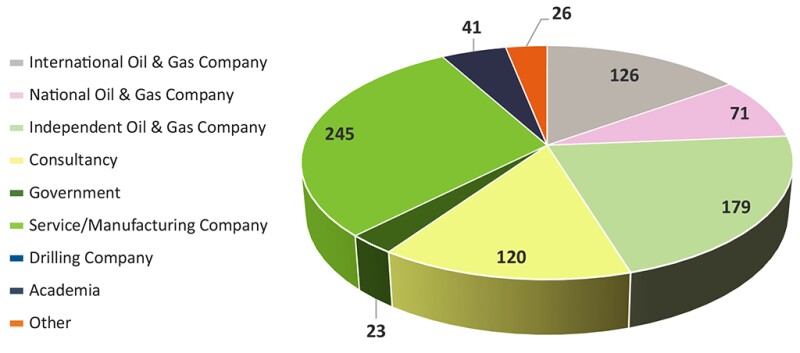
A total 49,370 email invitations were sent to a randomly selected subset of SPE members from around the world, and a total of 831 people participated in the survey. Fig. 1 and Table 1 outline the breakdown of respondents according to the type of organization by which they were employed. Table 2 shows what country the participants were normally working in when they responded to the survey, and Fig. 2 shows the size of organizations in which the participants were employed.
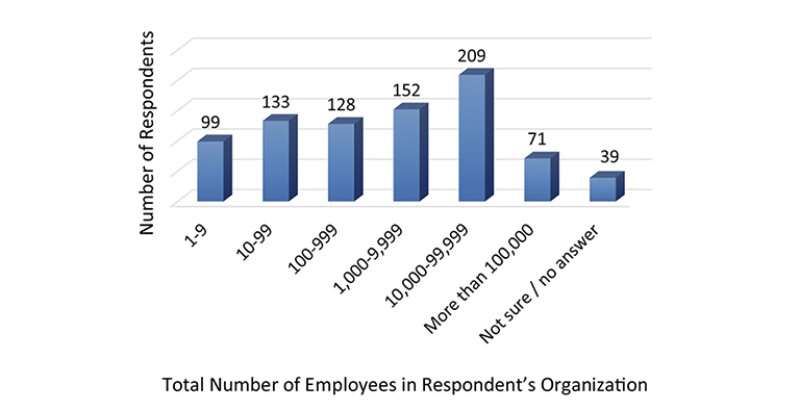
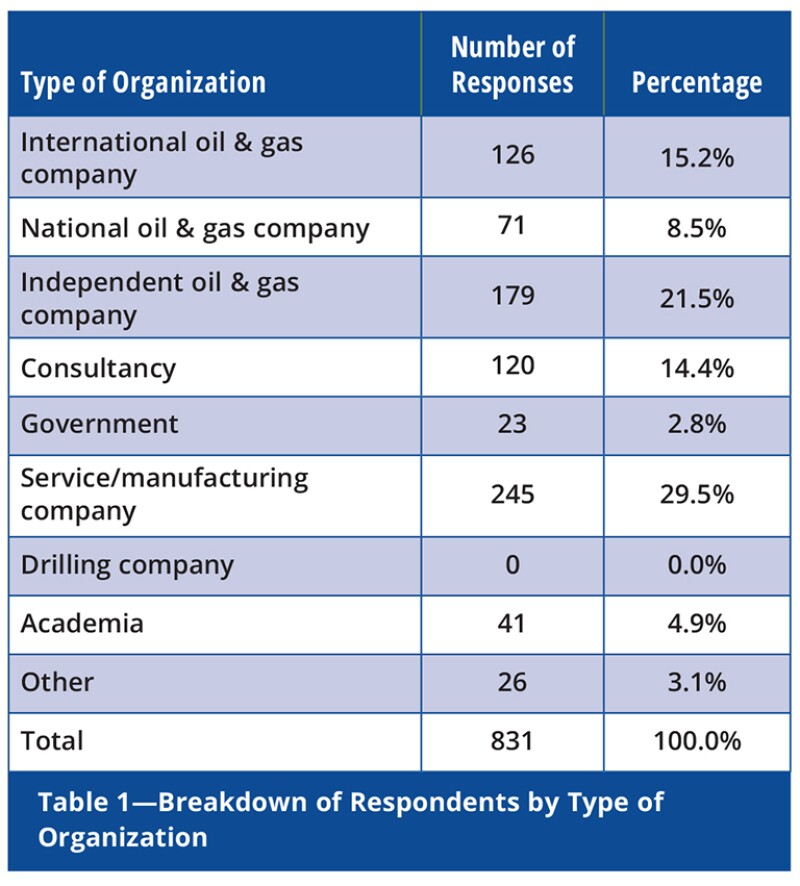
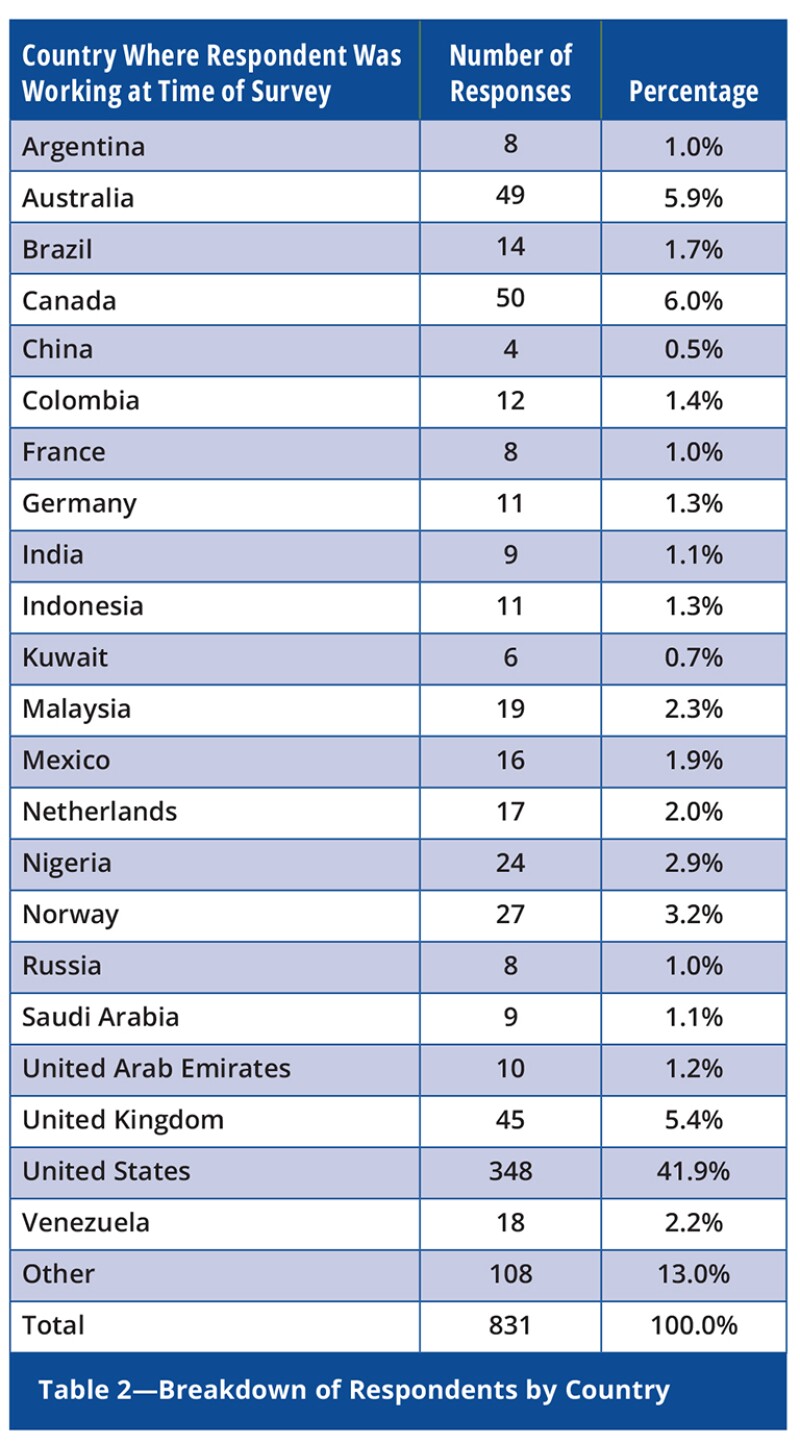
The survey asked seven questions focused specifically on each of the two innovation modes. To assess each participant’s exploration kinds of behaviors, they were asked the following questions.
To what extent did you engage in work-related activities in the past year that can be characterized as the following:
- Searching for new possibilities with respect to products/services, processes, or markets
- Evaluating diverse options with respect to product/services, processes, or markets
- Focusing on strong renewal of products/services or processes
- Activities of which the associated yields or costs are currently unclear
- Activities requiring quite some adaptability of you
- Activities requiring you to learn new skills or knowledge
- Activities that are not (yet) clearly existing company policy
To measure exploitation-related behaviors, we asked:
To what extent did you engage in work-related activities in the past year that can be characterized as the following:
- Activities in which you personally accumulated a lot of experience
- Activities which you carried out as if they were routine
- Activities which served existing (or internal) customers with existing services/products
- Activities for which it is clear to you how to conduct them
- Activities primarily focused on achieving short-term goals
- Activities which you can properly conduct by using your present knowledge
- Activities which clearly fit into existing company policy
Respondents were asked to capture the degree to which they agreed with each of the above statements on a Likert-style scale between 1 (“very little extent”) and 5 (“very large extent”). The results of the seven questions for each mode were added together into two cumulative variables: “exploration” and “exploitation.”
Highlights of Results
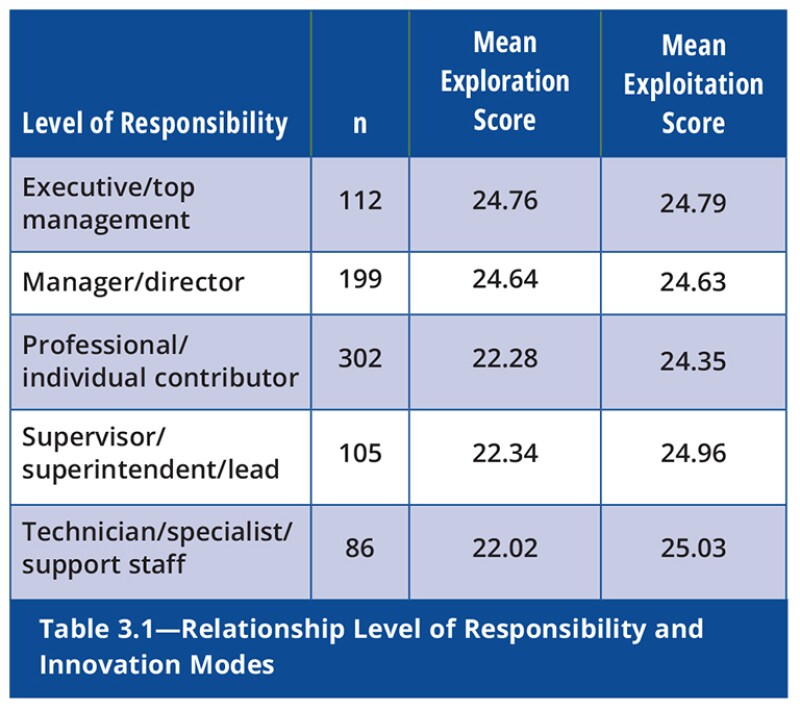
Table 3.1 shows that higher-level managers are slightly more inclined than lower-ranking employees to engage in the exploration kinds of activities that underpin technological innovation. Table 3.2 presents a group-by-group comparison of each group within the population of respondents for Exploration scores and confirms that these differences were statistically significant.
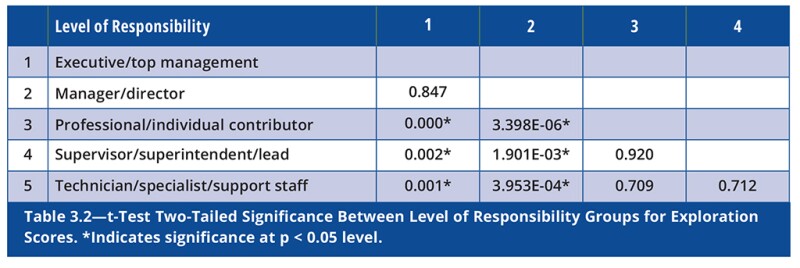
Tables 4.1 and 4.2 show a few interesting relationships with regards to job functions. Perhaps not surprisingly, respondents in R&D positions exhibited more exploration kinds of behaviors while having lower scores for exploitation. Even though the differences were statistically significant for both behavior types, it is worth noting that the differences were not especially pronounced. This suggests that the industry’s R&D community, who are often charged with serving as agents of technological change within the sector, often behave in a manner that is noticeably less risk-averse than the rest of the sector—but not much more than that.
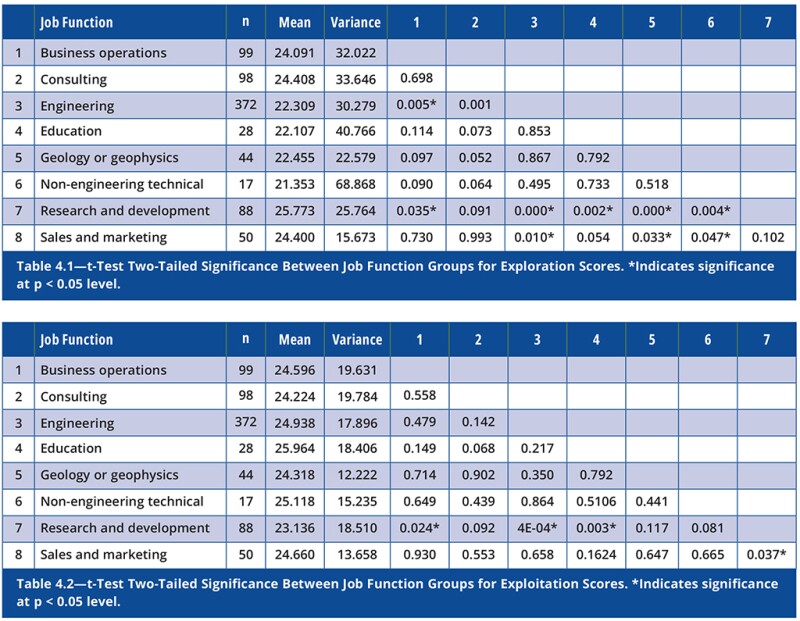
Table 5 shows that people who work for smaller companies tend to exhibit slightly higher levels of exploration kinds of behaviors than do people who work in larger organizations.
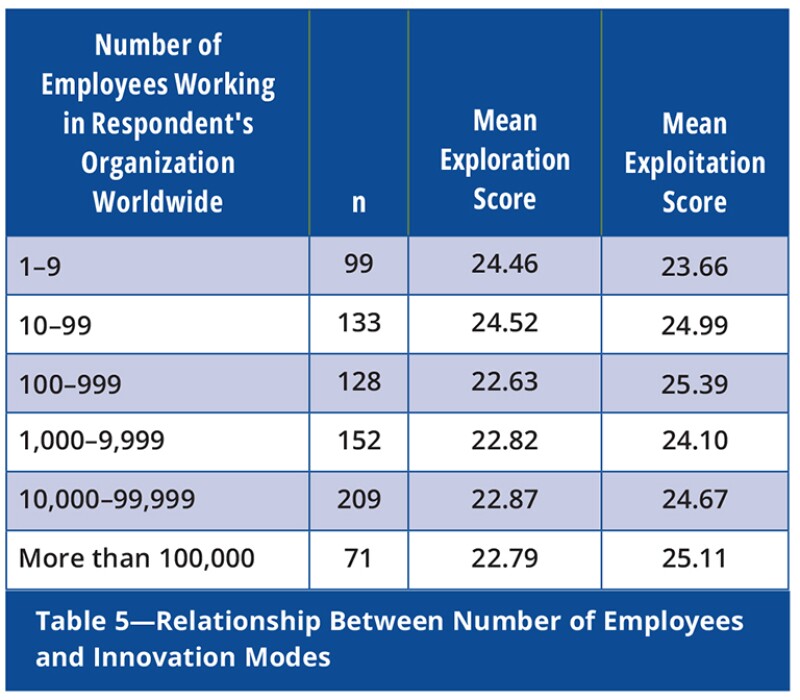
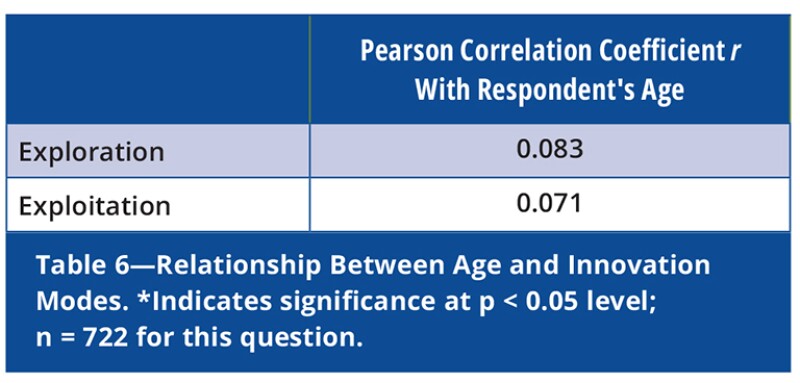
Table 6 shows that age did not play a materially important role in respondent’s exploration-related activities. The results for the exploitation part of this question were not statistically significant, and therefore do not provide reliable evidence in either direction.
Tables 7.1 and 7.2 show that people with graduate degrees have slightly higher levels of engagement in exploration kinds of activities than people who do not have them.
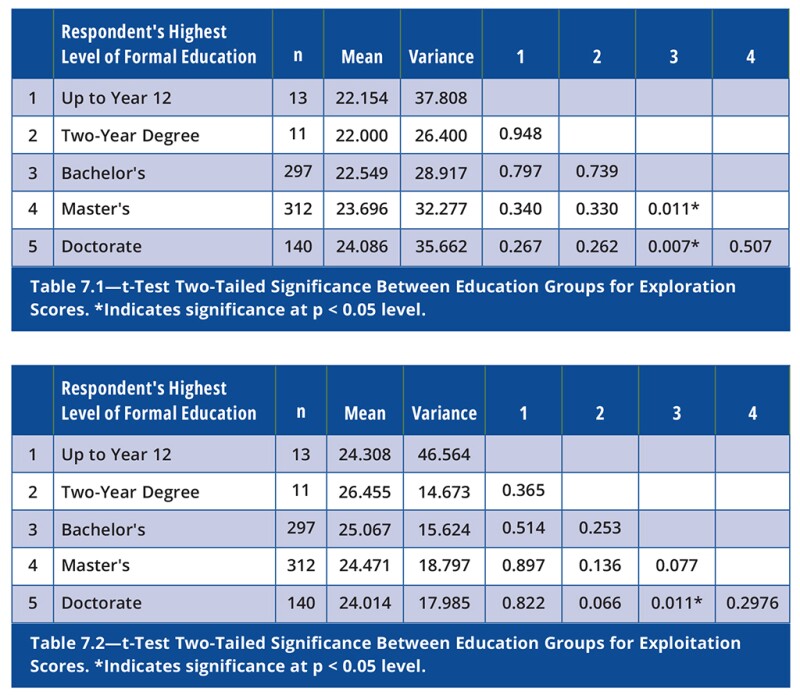
Table 8 suggests a slightly higher amount of engagement in exploration-related activities by people who grew up in Indonesia, Norway, and Russia. Conversely, people whose formative years were spent in Brazil and Venezuela reported that they were less involved in those kinds of activities.
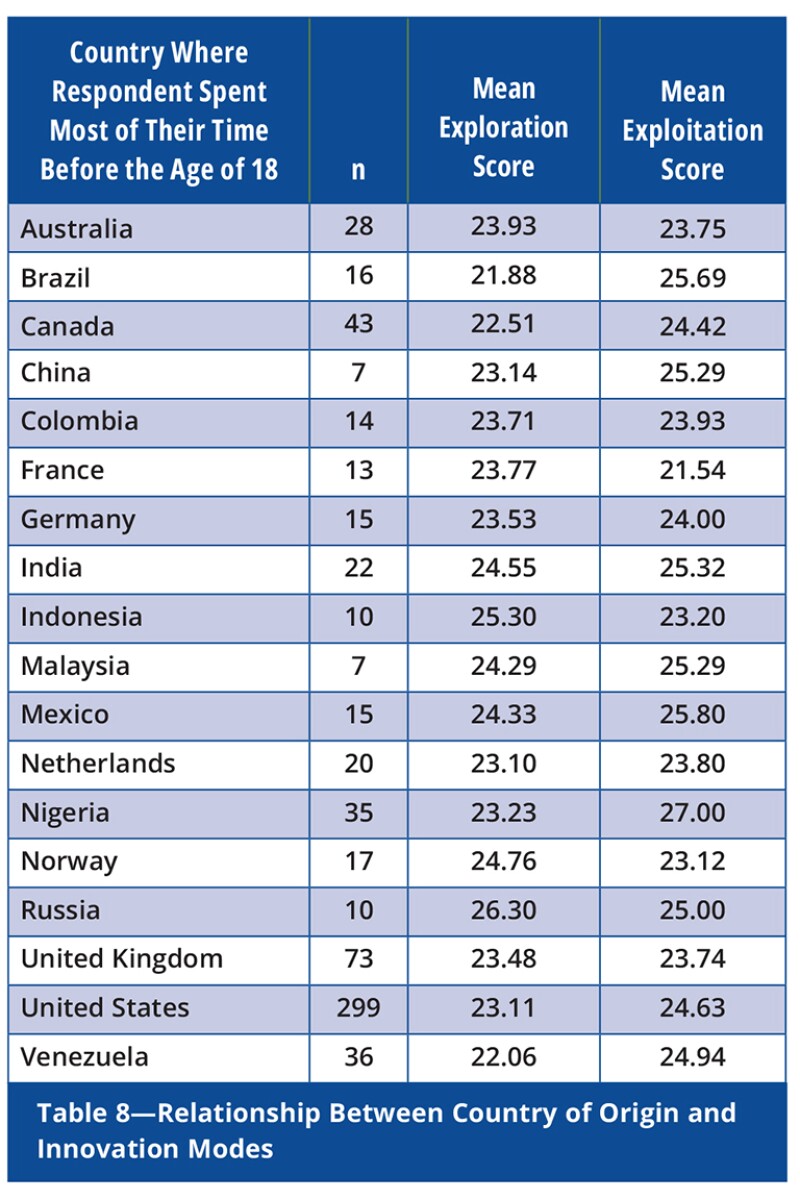
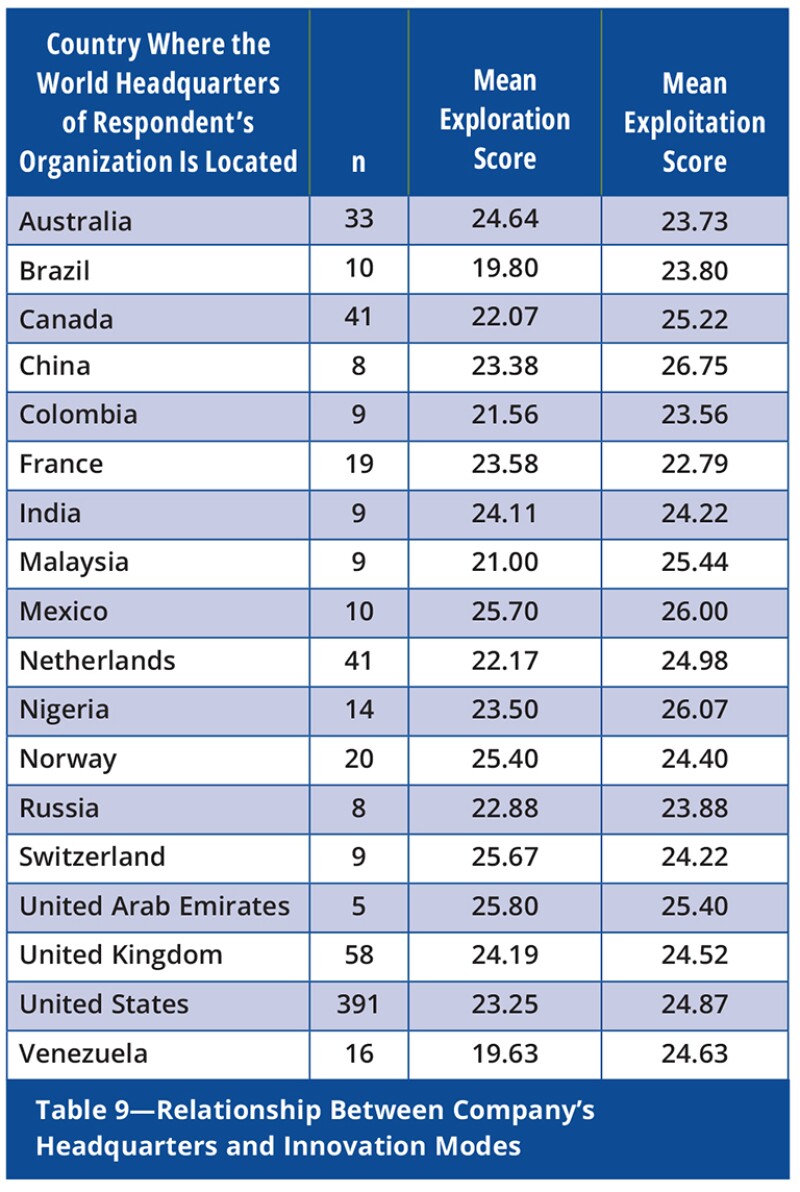
As shown in Table 9, a similar pattern emerges when looking at the headquarters of respondents’ employing companies. Here, too, participants from companies based in Brazil and Venezuela reported that they are less involved with exploration kinds of activities. Interestingly, however, respondents from companies headquartered in nearby Mexico indicated a slightly higher-than-average amount of exploration in their jobs.
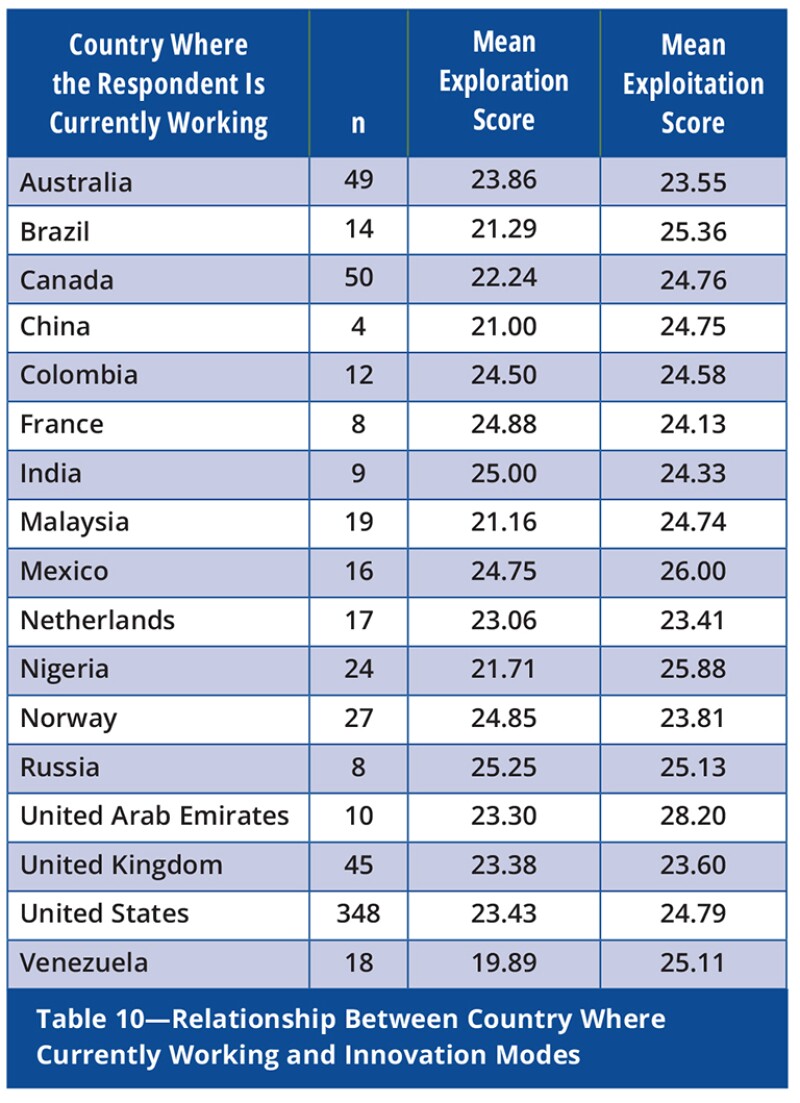
Table 10 reveals that where a person is currently working also plays some role in their innovativeness. No matter where they might have come from, people working in Brazil, China, Malaysia, Nigeria, and Venezuela reported having noticeably less exploration-like kinds of engagement in their professional lives than is true for most other parts of the world. By contrast, people working in India and Russia report having more than average.
Conclusions and Implications
The above findings carry with them several important implications. First, the discovery that people with graduate degrees were more likely to engage in exploration kinds of behaviors than people who did not reinforces the need for higher education as the industry continues to become more reliant on increasingly sophisticated technologies. The sector has historically been characterized in the literature as “slow clockspeed,” “low- and medium-tech,” “technologically timid,” and “low R&D intensity” because most companies in the industry have invested less than 1% of their net revenue in R&D. As the sector becomes increasingly digital and high-tech in nature, however, people with higher degrees will play an increasingly important role in the evolution of the industry.
Second, although younger people are often celebrated as being more innovative, our data show that this seems not to be true in the upstream oil and gas industry. The finding that age had little bearing on whether a respondent exhibited exploration kinds of behaviors draws into question stereotypes of older employees being less capable of innovation-related activities. Exploration behaviors can be found in people of almost every age, and human resources departments and recruiters throughout the industry would therefore do well to take full advantage of this finding.
Third, the discovery that people working in Brazil, China, Malaysia, Nigeria, and Venezuela all reported lower levels of exploration-like behavior than their counterparts elsewhere suggests that there could be significant structural or cultural barriers that make it harder for individuals in those locations to be as innovative as they could be. In light of the practically universal need for fresh ideas and new technologies in the sector around the world, government organizations and companies operating in those regions should diagnose and address the root causes behind this trend.
Acknowledgments
We gratefully acknowledge the contributions of Heather Donner and John Donnelly, who both worked for SPE when the survey was conducted. Heather’s hard work and incredible eye for detail were indispensable as we prepared the survey and collected the results, and the project would simply not have been possible without John’s support.
For Further Reading
SPE 166084 How Does Innovation Happen in the Upstream Oil & Gas Industry? Insights from a Global Survey by Robert K. Perrons, Queensland University of Technology and Integrated Energy Pty Ltd.
SPE 1212-0062-JPT Who Drives E&P Innovation? by Robert K. Perrons, Queensland University of Technology, and John Donnelly, Society of Petroleum Engineers.
SPE 191464 Who Are the Innovators in the Upstream Oil & Gas Industry? Insights From the 2017 SPE Global Innovation Survey by Robert K. Perrons, Queensland University of Technology; Henri Burgers, University of Queensland Business School; and Cameron Newton, Queensland University of Technology Business School.

Robert K. Perrons, SPE, is a full professor at the Queensland University of Technology (QUT) in Brisbane, Australia. Before joining QUT in 2011, he worked in a variety of roles for Shell International’s Exploration and Production division—including several years as a production engineer in overseas operations (offshore and onshore), and eventually serving as the company’s executive coordinator of global R&D. Perrons holds a BEng in mechanical engineering from McMaster University, a master’s in technology and policy from the Massachusetts Institute of Technology, and a PhD in engineering from the University of Cambridge, where he was a Gates Cambridge Scholar. He was named a Fulbright Scholar in 2020 and is a member of the United Nations’ Resources and Energy Expert Group. For more information and contact details, please visit www.perrons.net.

